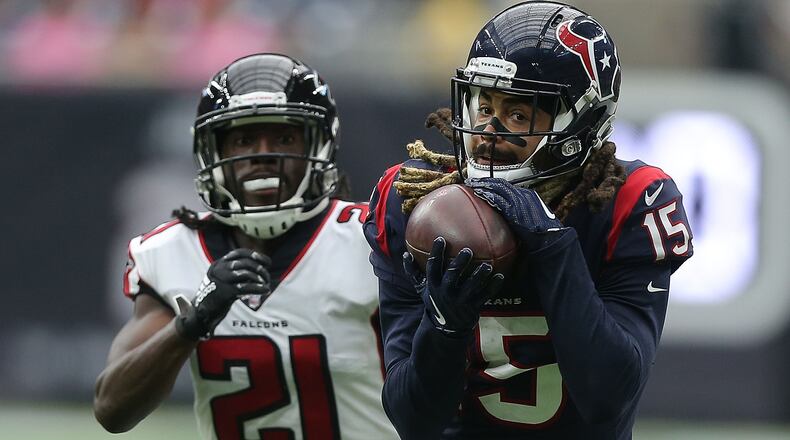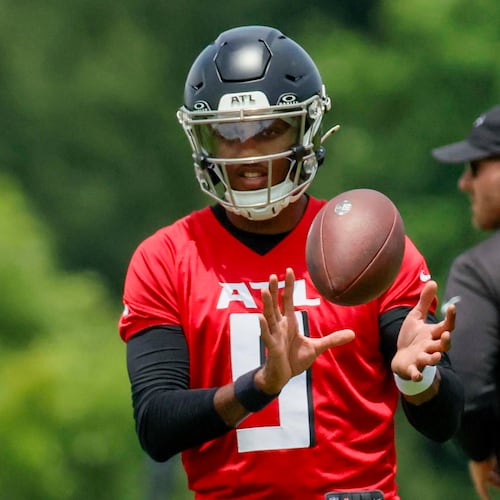When the Falcons begin to practice in earnest Wednesday in Phoenix for Sunday’s game against the Cardinals, there’s a chance that coach/defensive coordinator Dan Quinn will simplify the team’s defensive plan, and no, he is not inclined to give up defensive play-calling.
Quinn took over the defense in the offseason after letting go of coordinator Marquand Manuel – and offensive coordinator Steve Sarkisian and special-teams coordinator Keith Armstrong – and with a 1-4 record there’s a siren and a sign in the rearview mirror that says, “Changes not working.”
While he made his bones as a defensive coach, mostly working with linemen and later in the college and NFL ranks as a coordinator, Quinn has struggled to push the right buttons through the season’s first month. Or, a whole lot of players are under performing. Or both.
Numbers are not always everything, but these are outlandish: The Falcons rank next to last in the NFL in points allowed (30.4 per game), tied for next to last in third downs allowed (56.5 percent) and 23rd in total offense allowed (378.2 yards per game).
The third-down defense more than anything has to be fixed because that’s the down where football games most often live or die.
With several undeniably talented players, the Falcons’ slow start to the season is perplexing on many levels, and not just on defense. But those third-down statistics are numbing, and deadly. In Sunday’s 53-32 loss at Houston, the Texans converted 10 of 13 third-down plays into first downs or touchdowns.
Often in the second half, the Falcons were nowhere near opposing receivers or running backs, and there was next to no pass rush all day. Houston quarterback Deshaun Watson was hit only once and was not sacked after he was pummeled in the Texans’ first four games.
So, when the Falcons dove into work for an especially intense Monday of meetings, they dove in on third downs.
It’s an old refrain in sports when things are going poorly, but maybe the Falcons need to simplify. It may also help to pressure the passer with more than three rushers.
“When you get down to it, sometimes you have too many calls or too many things and how do you want to deny the ball?” Quinn said on a Monday teleconference from Phoenix. “We spent a good bit of time (Monday) together as a defense.
“We went through a five-game collection on some certain topics, and that was one of them and the calls we'll make and practice that over and over again so our consistency can be right on those.”
Part of the reason Quinn decided – before the season, by the way – to spend the week in Phoenix after the Houston game and before the Cardinals game was to foster team bonding.
The Falcons clearly need to stitch together themselves, particularly on defense.
This retreat is not going to be fun, and Quinn has to look at himself in the mirror.
“The key is the right call at the right time is usually where it's at,” he said. “That's what I think, as a team, certainly on third downs, that we can improve upon. To allow the amount of explosives we had (Sunday) and to show some of those inconsistencies, man, that hurt.
“That's what (Monday) was really about. We got together, we didn't make it about just one game ... we put the whole thing together, and it was a difficult day for us.”
If the Falcons do indeed shorten Quinn’s playlist and simplify calls, that won’t be fun, either.
It’s embarrassing to dumb oneself (selves?) down.
But there are so many problems on defense – the Falcons have five sacks, first-time starting cornerback Isaiah Oliver has struggled mightily and was benched in favor of rookie Kendall Sheffield, outside containment against the run is remarkably erratic, and ... those third downs! – that going back to basics may be just about a mandatory default move.
Quinn is not about to surrender defensive play-calling in a reverse move of 2016, when he took it from former defensive coordinator Richard Smith at roughly midseason.
“Trust me on that one; my ego is never as big as the team, and I will always do what's best for that,” he said. “At this time, I don't think that's where I'm at.”
OK, so try to make sure everybody understands where they’re supposed to be and what they’re supposed to do.
“Yeah, for sure you want to make sure, ‘Are you getting what (we’re) emphasizing?’” Quinn said. “If the mistakes are happening, usually you take things out to get it better grasped in terms of why there are some errors at certain times. There's a number of ways you can look at that. One, is there an individual person that has more?
“Is there a certain scheme or thing that can affect that? At the end of it, you want to make sure no free stuff (for opponents). Make (opponents) earn it, whether they (make) a throw on good leverage or they make a play, you can live with those. The free yards based on an error or technique assignment, those you have to get rid of.”
About the Author
Keep Reading
The Latest
Featured



